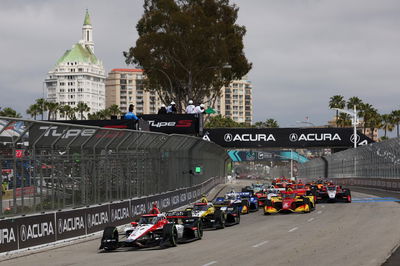Appeals panel overturns 'pop-off' ruling.
A three-judge appeals panel has issued a modification to the initial decision of the CART Protest Judges regarding Honda Performance Development's protest of the 15 June extension to the manifold pressure relief - or 'pop-off' - valve.
The decision, taken following an eight-hour hearing involving representatives from CART, HPD, Ford and Toyota, as well as various team owners and drivers, in Cleveland on Monday, will modify the original ruling, and suspend use of the three-quarter inch extension introduced to the valves in Detroit.
A three-judge appeals panel has issued a modification to the initial decision of the CART Protest Judges regarding Honda Performance Development's protest of the 15 June extension to the manifold pressure relief - or 'pop-off' - valve.
The decision, taken following an eight-hour hearing involving representatives from CART, HPD, Ford and Toyota, as well as various team owners and drivers, in Cleveland on Monday, will modify the original ruling, and suspend use of the three-quarter inch extension introduced to the valves in Detroit.
The extension is designed to reduce the potential influence of airflow upon the operation of the valve, but will not been seen again now until another meeting on 8 August, allowing CART and the engine manufacturers ample time to explore alternative solutions. If no suitable alternative is found, CART may re-implement use of the extension for the remainder of the FedEx Championship Series season.
The protest was filed by HPD and the Honda-powered teams of Team Green, Mo Nunn Racing and Adrian Fernandez Racing. Team Penske and Toyota joined the proceedings as interested parties. The protest was heard by an appellate panel consisting of chief appellate judge Philip Elliott and associate judges Dennis Dean and R. Steven Hearn. Each side had three hours to present its case to the panel.
The situation regarding the valve extension initially arose on Friday 15 June, when CART issued a bulletin mandating its use by all FedEx Championship Series engine manufacturers - Ford, Honda and Toyota - beginning with that weekend's Tenneco Automotive Grand Prix of Detroit.
HPD, along with three of its teams, filed an official protest the same day that outlined six grievances. The protest was heard and unanimously denied by the CART Protest Judges. The three judges concluded that there was no basis under the rules for granting HPD's protest and therefore it was denied.
HPD had three business days following the decision to file an appeal with CART and move to the next level in the process - the appellate panel - according to Chapter 12 of the CART Rule Book. The engine manufacturer opted for the appeal, which was heard in Cleveland, and is the final step in the CART appeal procedure.
As a result, the valve extension will be suspended for use at the Molson Indy in Toronto, Michigan 500 and Target Grand Prix at Chicago Motor Speedway. If no alternative is produced, the suspension will be lifted for the Miller Lite 200 at the Mid-Ohio Sports Car Course, scheduled for 10-12 August.
The decision of the appellate panel is conclusive, final, binding and non-litigable, and no person, team or body has standing to institute a cause of action in any civil court.










